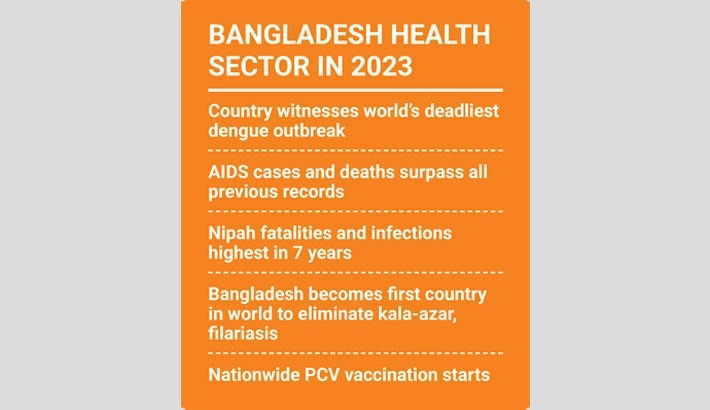Dengue brings Bangladesh to knees in 2023
There are also some inspiring achievements
Published: 30 Dec 2023

While Bangladesh’s health sector was brought to its knees in the outgoing year with the world’s deadliest outbreakof dengue, it also demonstrated efforts to face various challenges and at least could take pride in the recognition of eliminating visceral leishmaniasis or kala-azar and lymphatic filariasis.
With the mosquito-borne viral disease still taking a heavy toll on the people, they also suffered due to the prevalence of various communicable and non-communicable diseases (NCDs), lack of proper healthcare services in many cases and enough preventive measures against various diseases, and crises of different medicines, including normal IV saline, sources said.
“Alongside challenges, there are a lot of achievements of the health sector this year as we have been able to eliminate kala-azar and filariasis, kept Covid-19 infection under control, conducted vaccinations, including HPV,” DGHS Additional Director General (Planning and Development) Ahmedul Kabir told the Daily Sun.
He also said the government’s ability to ensure health services and tackle outbreak situationshas also been improved with the setting up of a vaccine plant, oxygen plants, and 10-bed intensive care units in district hospitals across the country.
Health experts said taking experience from the situation of the outgoing year, the government has to be prepared to ensure proper health services for the people, preventand tackle outbreaks, and ensure Universal Health Coverage (UHC) in the days to come.
“The year 2023 witnessed an unprecedented dengue outbreak. The virus spread all over the country and it may recur. We have to take lessons from this to improve health services and for preventive measures,” Benzir Ahmed, a public health expert, told the Daily Sun.
He said the health sector has to prepare to face the potential influenza pandemic and further rise of Covid-19 infection with a new sub-variantthathas already spread in many countries.
“Emergency response teams will have to be prepared, improving health services, increasing facilities, including ICU services, making necessary medical machinery and devices available, increasing reagents, and widening diagnostic facilities are vital for the health sector,” Benzir added.
Of the communicable diseases, the country was affected by dengue, AIDS, and Nipah, along with diarrhoea, cholera, tuberculosis, malaria, and respiratory infection like pneumonia. According to the Directorate General of Health Services (DGHS), the country faced the worst-ever dengue crisis in 2023 as it reported the world’s highest number of fatalities from the disease.
The official data said 3,21,001 dengue patients were admitted to hospitals and 1,702 died across the country between 1 January and 29 December. The fatality rate stood at 0.5%.
The health sector faced difficulty in tackling the situation with the hospitals overwhelmed by patients, crises of test reagents, normal IV saline,and ICU, and a lack of testing facilities.
In the case of the deadly disease of AIDS, the country witnessed a significant rise inpatients and deaths this year, surpassing all previous records since the official detection of AIDS cases in 1989.
Bangladesh recorded 1,276 fresh cases and 266 fatalities in 2023, according to the DGHS.
A total of 10,984 AIDS cases and 2,086 deaths were reported in the country in the past 34 years, the health authorities said.
Besides, at least 10 people died of Nipah virus in Bangladesh with 14 cases detected this year. The death toll from this viral disease is the highest in the last seven years. The fatality rate was reported at more than 70%.
The Covid-19 infection remained totally under control as the daily infection rate declined to below 5% around the year.
The DGHS and hospital sources said NCDs routinely remained a burden in the country as the number of new NCD patients suffering from heart diseases, kidney, hypertension, cancer, diabetes, and bone diseases increased in the year.
There is no specific data available in the hand of DGHS on how many patients have increased in the year exactly.
Apart from this, the country is also facing serious drug resistance problems, including antibiotic resistance, due to the excessive use of antibiotics in humans and animals.
Alongside the crisis, the health sector of the country had some achievements in the outgoing year like eliminating kala-azar and lymphatic filariasis.
In May, the World Health Organization (WHO) declared that Bangladesh eliminated lymphatic filariasis which was a major public health problem in the country. Lymphatic filariasis, also known as elephantiasis, occurs when filarial parasites are transmitted to humans through mosquito bites.
In a monumental achievement, Bangladesh has become the first country in the world to be officially validated for having eliminated visceral leishmaniasis, commonly known as kala-azar. The WHO declared it in October this year.
In January, doctors at Bangabandhu Sheikh Mujib Medical University (BSMMU) successfully transplanted kidneys from a brain-dead patient into two female patients. It was the country's first-ever cadaveric organ transplant successfully performed by the Bangladeshi doctors. At the same time, the country's first Super Specialised Hospital under the BSMMU began operations with indoor and outdooractivities in July.
As part of its plan to inoculate 10 million girls with the HPV (human papillomavirus) vaccine, the government in October started the inoculation free of cost in a bid to help prevent deaths from cervical cancer throughout the country.
The prices of different types of drugs and medical devices also increased in 2023. Although the Directorate General of Drug Administration (DGDA) reduced the maximum retail prices of different types of coronary stents by 20%-43% with an effect from 16 December, it has created complexity as the retailer companies were not reportedly following this.
The Drugs and Cosmetics Bill 2023 was passed in parliament in September with an aim to prevent the excessive use of antibiotics, production, and sale of adulterated drugs.
For the FY2023-24, the country’s health sector got a Tk38,052 crore budget allocation which is 5% of the total national budget. Experts said it is not enough to implement the UHC.

